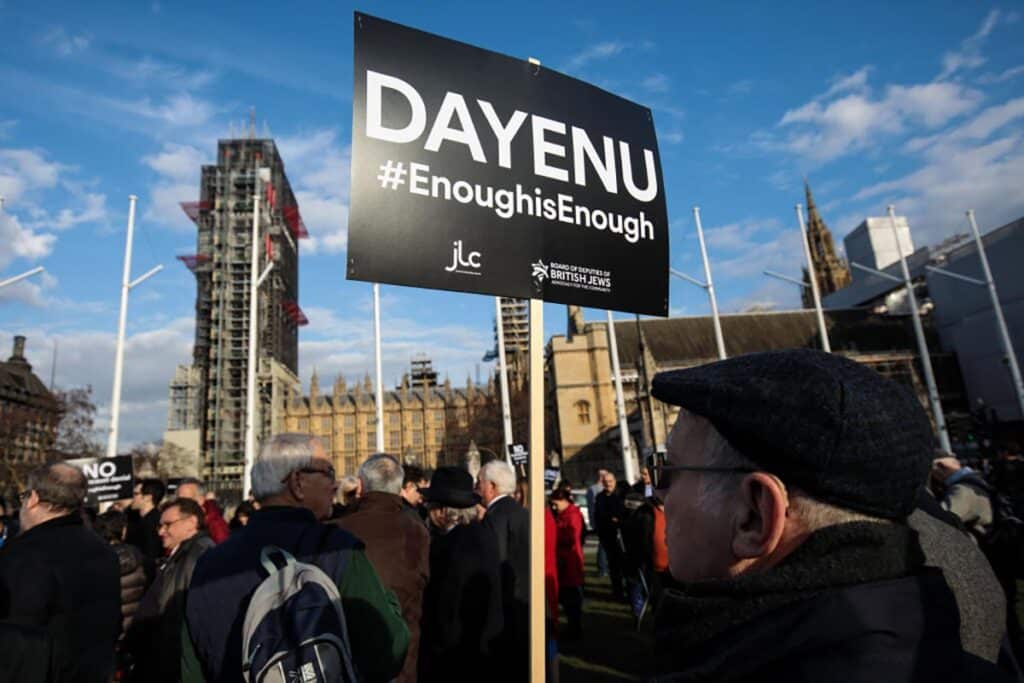
“I’m feeling uncomfortable,” said a member of my school’s Council for Unity sitting next to me at the national ADL ‘Never is Now’ summit on antisemitism. “They’re only talking about Jews…”
As the leader of my school’s Jewish Student Union, I was invited to attend this conference, along with the Council for Unity, a club that promotes safety and unity within our public school.
Our school community has been experiencing an excessive amount of antisemitism within the past month, such as a yeshiva student being egged across the street from the building and swastikas carved into furniture.
Therefore, I was confused by the sudden discomfort of my classmate, so we stepped outside of the opening session, where the CEO had just given a welcome speech, to discuss the situation.
I learned that my classmate and the majority of the group, who knew they would be attending an ADL conference, had never heard the word “antisemitism.”
For a young Jewish student like myself, it was hard to believe that something I experience frequently is not a household word for others. Initially, I was shocked and started to feel a little uncomfortable myself.
It was intimidating to be the only Jewish student from my school at this event, who had some prior knowledge on antisemitism and understood how important this conference was.
At that moment, I felt angry and disappointed in the lack of knowledge about antisemitism and the Holocaust, and felt it was my responsibility to educate my classmates, who had no idea that six million Jews were murdered in the Holocaust.
We talked for about 20 minutes, and although this wasn’t nearly enough time to explain the struggles and history of the Jewish people, it was an eye-opening conversation for the Council for Unity members and me.
They learned about the hate they never knew was so prevalent, and I realized that they are not the only teenagers or adults lacking such knowledge.
According to a recent American Jewish Committee survey, nearly half of Americans over age 18 do not know what the word “antisemitism” means.
In addition, 63% of Millennials and Gen Z in the U.S. do not know that 6 million Jews were killed during the Holocaust, and nearly half cannot name a single concentration camp established during World War II, according to a survey by the Claims Conference.
Almost every single Jewish student has dealt with antisemitism in school and online. Whether it’s a lack of knowledge on the subject or direct antisemitic comments, we often don’t know how to react in these situations.
Especially when put on the spot, we find ourselves stumped, wanting to jump to conclusions, and immediately turn to defense mode.
Here are some things to keep in mind the next time you’re in a similar situation, and although we don’t hope for a next time, we know there may be a few.
1. Educate yourself about antisemitism.
People often misunderstand antisemitism and compare it to other forms of hate. One key difference is its longevity and persistence throughout history. Antisemitism has been around for thousands of years, dating back to ancient times, and has persisted in various forms through the present day.
Antisemitism was even portrayed in art, with some of the pieces dating back to the 13th century. Here are two examples from the U.S. Holocaust Memorial Museum’s exhibit, “500 Years of Antisemitic Propaganda: The Katz-Ehrenthal Collection”:

This is the oldest piece in the collection. It depicts a blood libel, which was a false accusation that has been made against Jews for centuries, alleging that they kidnap and murder Christian children in order to use their blood in religious rituals.
In 1475, a tragic incident occurred when a 2-year-old Christian boy named Simon was found dead, which was falsely attributed to Jews and led to further persecution.

European artisans also commonly decorated everyday objects with caricatures of Jewish faces. These walking sticks are examples of racial antisemitism becoming a part of everyday life.
Antisemitism is often characterized by conspiracy theories and scapegoating where Jews are blamed for a wide range of social, economic, and political problems.
The world’s oldest hatred has mutated over the past few decades. With the rise of social media, prejudices have found new platforms to spread and evolve. Modern antisemites like Kanye West have a very strong influence over their followers and alter people’s points of view from a young age. Antisemitism has always existed and it continues today.
To educate yourself about antisemitism, I recommend checking out the video series “Antisemitism, Explained” from Unpacked.
2. Educate yourself about anti-Zionism.
Anti-Zionism is very relevant in today’s society, but a lot of people don’t realize when their intense criticism of the Jewish state crosses the line into antisemitism.
We need to be aware of these instances. If you see a friend posting something anti-Zionist, kindly swipe up and inform them that anti-Zionism is a form of antisemitism.
While it is completely valid to criticize the Israeli government, denying the historic ties of the Jewish people to the land of Israel, or Israel’s right to exist as a Jewish state, is antisemitic.
For more information on Zionism, watch this video:
You can also check out this article about six different types of Zionist thinking.
3. Be prepared with data.
If words don’t get through to people, numbers often put things into perspective. There are 8 billion people on our planet, and Jews make up around only 15 million of that. Although that may seem like a big number, it’s less than 0.2% of the world’s population.
Six million Jewish people were murdered in the Holocaust for no other reason than their religion. Even now, almost 80 years later, Jewish people experience hate crimes daily.
According to the ADL, there has been a rise in antisemitic incidents in recent years. Here are some statistics from the most recent reports:
- There were more than 2,700 antisemitic incidents in the U.S. in 2021, a 34% increase from 2020 and the highest number on record since 1979.
- Incidents at K-12 schools, colleges, and universities increased in 2021. ADL logged a 21% increase in incidents at non-Jewish K-12 schools, as well as at colleges and universities, between 2020 and 2021.
- Incidents at Jewish institutions such as synagogues and Jewish schools increased by 61% between 2020 and 2021.
Meanwhile, according to the FBI’s annual data on hate crimes, crimes targeting the Jewish community consistently comprise more than half of all religiously-motivated crimes.

Using concrete numbers and facts builds trust with your audience and demonstrates that your position is based on objective information. The facts are also easier to understand for people who are new to the subject, and can build your credibility.
Most importantly, numbers put into perspective how prevalent antisemitism truly is, and drive people to be informed about current issues.
4. Keep an open mind.
We need to be aware of why people might be antisemitic. Hate stems from ignorance. Nowadays, teenagers tend to keep up with current events strictly on social media platforms like Instagram and TikTok, instead of looking for reliable sources.
Social media often spreads inaccurate information. It is also important to recognize that some individuals may not have had access to or been taught how to verify information properly.
Therefore, although some might want to penalize uneducated people, let’s remember that everyone’s circumstances are different, and we must give them a chance to learn.
Instead of fighting hate with more hate, we can try to be the bigger person and explain the situation first. If we keep an open mind and try to understand our conversationalist’s point of view, they will be inclined to do so, too.
We can inquire where they got their information, and direct them to a reliable source such as Unpacked content or the ADL.
While there will always be those who resist change, we can make a difference by standing up for what is right and spreading accurate information about Jewish history and culture.
In conclusion, education and compassion are crucial tools in combating antisemitism. By approaching the issue with an open mind and spreading accurate information, we can work toward creating a more inclusive and tolerant society.
Originally Published Apr 2, 2023 02:34PM EDT
